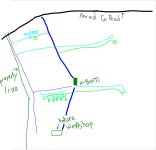Dadnatron
Veteran Member
OK all you plumbing aficionados, I have a few questions about pressure, backflow valves, and automatic paddock livestock waterers.
Needs:
1. Water to be brought about 1400ft to barn from City water source?
2. At least 2 livestock waterers to be put in, between the city water line and the barn.
3. At least 6 livestock waterers to be put in AFTER/PAST the barn.
4. Water taken another 1200 or so feet past the barn to site of future workshop.
Potential problems as I see it
1. Possibly, the largest tap for this line is 1? This is uncertain, but the lady at the water district said to her knowledge, 1 is max. She is referring me to the main guy who is currently on vacation until Monday for final word. My water guy recommended a 1½" tap for my projected needs. But it was an off the cuff comment, not a calculation.
2. I would like to pull water off the line before the barn for the 2 intervening waterers. I want shut off valves and pressure reducers on each stub and I suspect I will need to have a backflow preventer given they will be coming off the main line to the barn.
3. If 1 is max, how much water would be needed? Is it enough? I don't think there would be a big need for any Constant or high volume use at any given time, except for potentially use in the wash stall. Otherwise, I suspect everything would be random use at all varied locations. Each of which would easily be handled by a 1 line.
Questions:
1. Do I need backflow valves in my situation? I'd rather not be drinking horse spit if I have the option.
2. Would it be better to take a single line off the main line, then split it into 2 different lines for the intervening waterers? Or just take off 2 separate lines at the locations needed? (I think I will be pulling/installing my own water lines to the waterers so other than hassle, the cost of burial won't be the major deciding factor either way.
3. I will have several waterers in small paddocks relatively close together. ie 5 waterers in small fenced paddocs on 4ac. Should I run a long main pipe from the barn, as a feeder then stub off that pipe for each individual waterer?
4. I have options for where to bring the water into my property. My installer likes to take it down a known fence line to insure ease of finding it/avoiding it in the future. ie 20' of the fence or property line. This would require a longer distance install as well as running water lines to waterers a greater distance.

Needs:
1. Water to be brought about 1400ft to barn from City water source?
2. At least 2 livestock waterers to be put in, between the city water line and the barn.
3. At least 6 livestock waterers to be put in AFTER/PAST the barn.
4. Water taken another 1200 or so feet past the barn to site of future workshop.
Potential problems as I see it
1. Possibly, the largest tap for this line is 1? This is uncertain, but the lady at the water district said to her knowledge, 1 is max. She is referring me to the main guy who is currently on vacation until Monday for final word. My water guy recommended a 1½" tap for my projected needs. But it was an off the cuff comment, not a calculation.
2. I would like to pull water off the line before the barn for the 2 intervening waterers. I want shut off valves and pressure reducers on each stub and I suspect I will need to have a backflow preventer given they will be coming off the main line to the barn.
3. If 1 is max, how much water would be needed? Is it enough? I don't think there would be a big need for any Constant or high volume use at any given time, except for potentially use in the wash stall. Otherwise, I suspect everything would be random use at all varied locations. Each of which would easily be handled by a 1 line.
Questions:
1. Do I need backflow valves in my situation? I'd rather not be drinking horse spit if I have the option.
2. Would it be better to take a single line off the main line, then split it into 2 different lines for the intervening waterers? Or just take off 2 separate lines at the locations needed? (I think I will be pulling/installing my own water lines to the waterers so other than hassle, the cost of burial won't be the major deciding factor either way.
3. I will have several waterers in small paddocks relatively close together. ie 5 waterers in small fenced paddocs on 4ac. Should I run a long main pipe from the barn, as a feeder then stub off that pipe for each individual waterer?
4. I have options for where to bring the water into my property. My installer likes to take it down a known fence line to insure ease of finding it/avoiding it in the future. ie 20' of the fence or property line. This would require a longer distance install as well as running water lines to waterers a greater distance.

